Paulo R. B. Gomes
Joint Channel and Symbol Estimation for Communication Systems with Movable Antennas
Jun 08, 2025Abstract:Communication systems aided by movable antennas have been the subject of recent research due to their potentially increased spatial degrees of freedom offered by optimizing the antenna positioning at the transmitter and/or receiver. In this context, a topic that deserves attention is channel estimation. Conventional methods reported recently rely on pilot-assisted strategies to estimate the channel coefficients. In this work, we address the joint channel and symbol estimation problem for an uplink multi-user communication system, where the base station is equipped with a movable antenna array. A semi-blind receiver based on the PARAFAC2 model is formulated to exploit the tensor decomposition structure for the received signals, from which channel and symbol estimates can be jointly obtained via an alternating estimation algorithm. Compared with reference schemes, our preliminary numerical simulations yield remarkable results for the proposed method.
Circuit-Based Modeling Approach for Channel Estimation in RIS-Assisted Communications
Jun 08, 2025



Abstract:Reconfigurable intelligent surface (RIS) has been explored as a supportive technology for wireless communication since around 2019. While the literature highlights the potential of RIS in different modern applications, two key issues have gained significant attention from the research community: channel estimation and phase shift optimization. The performance gains of RIS-assisted systems rely heavily on optimal phase shifts, which, in turn, depend on accurate channel estimation. Several studies have addressed these challenges under different assumptions. Some works consider a range of continuous phase shifts, while others propose a limited number of discrete phase values for the RIS elements. Many studies present an idealized perspective, whereas others aim to approximate more practical aspects by considering circuit system responses and employing phase shifts derived from a Discrete Fourier Transform (DFT) or other lookup tables. However, to our knowledge, no study has examined the influence of circuit system parameters on channel estimation and subsequent phase shift optimization. This paper models each RIS element as an equivalent resonant circuit composed of resistance, capacitance, and inductance. We propose that resistance and capacitance parameters can be dynamically and independently configured, leading to the formulation of an impedance matrix. Furthermore, we construct a circuit-based RIS phase shift matrix that accounts for the response of the resonant circuit, which changes with variations in the physical parameters of resistance and capacitance. We investigate the impact of this circuit-based RIS phase shift within a tensor-based channel estimation approach. Our results indicate a performance loss compared to ideal scenarios, such as those using the DFT design. However, we found that increasing the training time can mitigate this performance degradation.
Joint Downlink-Uplink Channel Estimation for Non-Reciprocal RIS-Assisted Communications
Dec 20, 2024Abstract:Reconfigurable intelligent surface (RIS) is a recent low-cost and energy-efficient technology with potential applicability for future wireless communications. Performance gains achieved by employing RIS directly depend on accurate channel estimation (CE). It is common in the literature to assume channel reciprocity due to the facilities provided by this assumption, such as no channel feedback, beamforming simplification, and latency reduction. However, in practice, due to hardware limitations at the RIS and transceivers, the channel non-reciprocity may occur naturally, so such behavior needs to be considered. In this paper, we focus on the CE problem in a non-reciprocal RIS-assisted multiple-input multiple-output (MIMO) wireless communication system. Making use of a novel closed-loop three-phase protocol for non-reciprocal CE estimation, we propose a two-stage fourth-order Tucker decomposition-based CE algorithm. In contrast to classical time-division duplexing (TDD) and frequency-division duplexing (FDD) approaches the proposed method concentrates all the processing burden for CE on the base station (BS) side, thereby freeing hardware-limited user terminal (UT) from this task. Our simulation results show that the proposed method has satisfactory performance in terms of CE accuracy compared to benchmark FDD LS-based and tensor-based techniques.
Channel Estimation in RIS-Assisted MIMO Systems Operating Under Imperfections
Jul 06, 2022



Abstract:Reconfigurable intelligent surface is a potential technology component of future wireless networks due to its capability of shaping the wireless environment. The promising MIMO systems in terms of extended coverage and enhanced capacity are, however, critically dependent on the accuracy of the channel state information. However, traditional channel estimation schemes are not applicable in RIS-assisted MIMO networks, since passive RISs typically lack the signal processing capabilities that are assumed by channel estimation algorithms. This becomes most problematic when physical imperfections or electronic impairments affect the RIS due to its exposition to different environmental effects or caused by hardware limitations from the circuitry. While these real-world effects are typically ignored in the literature, in this paper we propose efficient channel estimation schemes for RIS-assisted MIMO systems taking different imperfections into account. Specifically, we propose two sets of tensor-based algorithms, based on the parallel factor analysis decomposition schemes. First, by assuming a long-term model in which the RIS imperfections, modeled as unknown phase shifts, are static within the channel coherence time we formulate an iterative alternating least squares (ALS)-based algorithm for the joint estimation of the communication channels and the unknown phase deviations. Next, we develop the short-term imperfection model, which allows both amplitude and phase RIS imperfections to be non-static with respect to the channel coherence time. We propose two iterative ALS-based and closed-form higher order singular value decomposition-based algorithms for the joint estimation of the channels and the unknown impairments. Moreover, we analyze the identifiability and computational complexity of the proposed algorithms and study the effects of various imperfections on the channel estimation quality.
Reducing the Control Overhead of Intelligent Reconfigurable Surfaces Via a Tensor-Based Low-Rank Factorization Approach
Jun 10, 2022
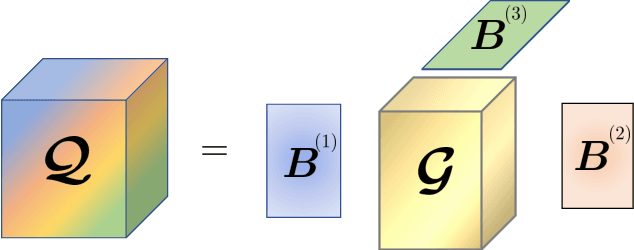

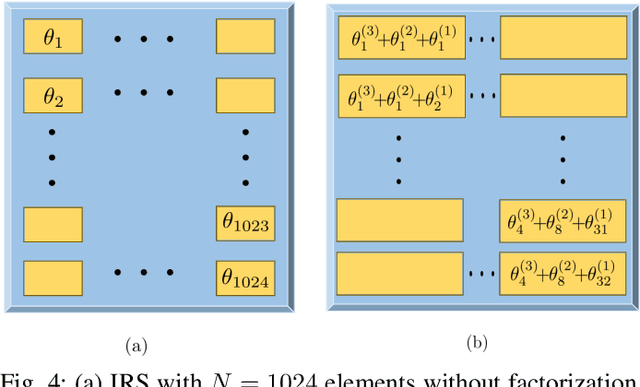
Abstract:Passive intelligent reconfigurable surfaces (IRS) are becoming an attractive component of cellular networks due to their ability of shaping the propagation environment and thereby improving the coverage. While passive IRS nodes incorporate a great number of phase-shifting elements and a controller entity, the phase-shifts are typically determined by the cellular base station (BS) due to its computational capability. Since the fine granularity control of the large number of phase-shifters may become prohibitive in practice, it is important to reduce the control overhead between the BS and the IRS controller. To this end, in this paper we propose a low-rank approximation of the near-optimal phase-shifts, which would incur prohibitively high communication overhead on the BS-IRS controller links. The key idea is to represent the potentially large IRS phase-shift vector using a low-rank tensor model. This is achieved by factorizing a tensorized version of the IRS phase-shift vector, where each component is modeled as the Kronecker product of a predefined number of factors of smaller sizes, which can be obtained via tensor decomposition algorithms. We show that the proposed low-rank models drastically reduce the required feedback requirements associated with the BS-IRS control links. Our simulation results indicate that the proposed method is especially attractive in scenarios with a strong line of sight component, in which case nearly the same spectral efficiency is reached as in the cases with near-optimal phase-shifts, but with a drastically reduced communication overhead.
Tensor-Based Channel Estimation for RIS-Assisted Networks Operating Under Imperfections
Jun 07, 2022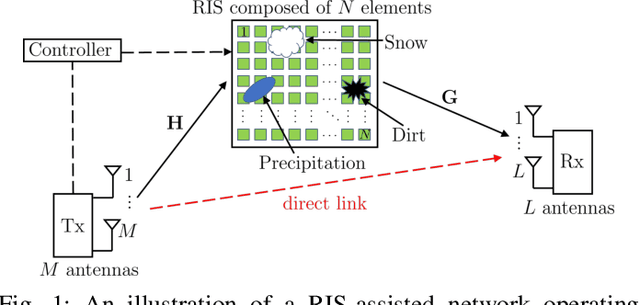
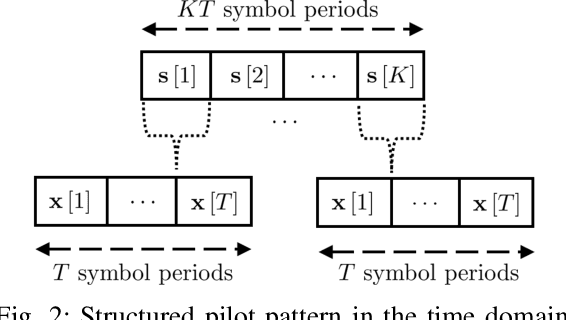

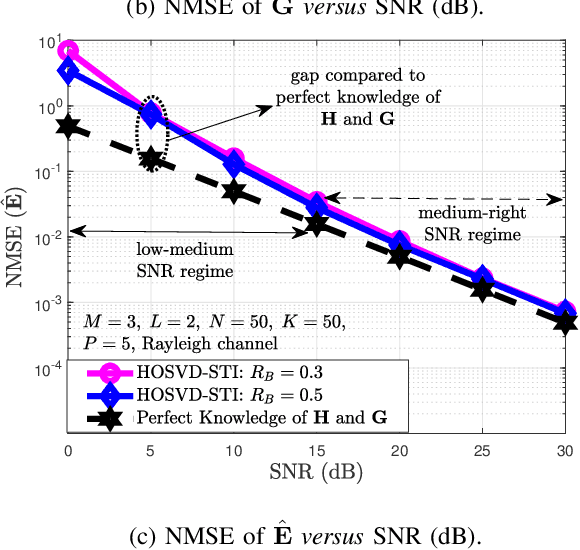
Abstract:Reconfigurable intelligent surface (RIS) is a candidate technology for future wireless networks. It enables to shape the wireless environment to reach massive connectivity and enhanced data rate. The promising gains of RIS-assisted networks are, however, strongly depends on the accuracy of the channel state information. Due to the passive nature of the RIS elements, channel estimation may become challenging. This becomes most evident when physical imperfections or electronic impairments affect the RIS due to its exposition to different environmental effects or caused by hardware limitations from the circuitry. In this paper, we propose an efficient and low-complexity tensor-based channel estimation approach in RIS-assisted networks taking different imperfections into account. By assuming a short-term model in which the RIS imperfections behavior, modeled as unknown amplitude and phase shifts deviations, is non-static with respect to the channel coherence time, we formulate a closed-form higher order singular value decomposition based algorithm for the joint estimation of the involved channels and the unknown impairments. Furthermore, the identifiability and computational complexity of the proposed algorithm are analyzed, and we study the effect of different imperfections on the channel estimation quality. Simulation results demonstrate the effectiveness of our proposed tensor-based algorithm in terms of the estimation accuracy and computational complexity compared to competing tensor-based iterative alternating solutions.
IRS Phase-Shift Feedback Overhead-Aware Model Based on Rank-One Tensor Approximation
May 24, 2022



Abstract:In this paper, we propose a rank-one tensor modeling approach that yields a compact representation of the optimum IRS phase-shift vector for reducing the feedback overhead. The main idea consists of factorizing the IRS phase-shift vector as a Kronecker product of smaller vectors, namely factors. The proposed phase-shift model allows the network to trade-off between achievable data rate and feedback reduction by controling the factorization parameters. Our simulations show that the proposed phase-shift factorization drastically reduces the feedback overhead, while improving the data rate in some scenarios, compared to the state-of-the-art schemes.
 Add to Chrome
Add to Chrome Add to Firefox
Add to Firefox Add to Edge
Add to Edge